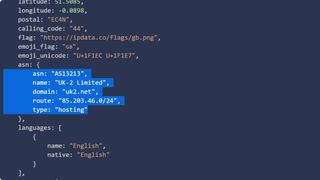What is a residential IP address, and why might your VPN need one?
Bypass VPN detection blocking (maybe) with this stealthy scheme

It's everyone's first lesson in how the web works: when you go online, your ISP gives you an IP address, and this identifies your location. It's the address servers use when they route content back to you.
What's not so often discussed is that IP addresses come in two different flavors: datacenter or residential. And that's a pity, because in some situations this can be very, very important.
Have you ever found hat your VPN wouldn't unblock your favorite streaming platform, for instance? If you haven't before, you may do one day - even the best Netflix VPNs are finding it more and more of a challenge to get around the popular service's geo-blocking.
Maybe you've run into trouble with Google or some other site displaying warnings, because your IP address has been used by so many hackers it's now blacklisted? This might be due to your IP type, and in this article we'll explain why and what you might be able to do about it.
- What is a VPN? Get back to basics with our explainer
- And what about free VPNs? Are they any good?
- Working from home? Then see the best remote desktop software
What is a residential IP address?
A residential IP is an address that is assigned from an ISP to a homeowner, and is associated with a single owner and location.
Go to ipdata , for example, and after a few seconds, the site displays your IP address, its assigned location and your ISP name.
A datacenter IP is an address which isn't owned by an ISP. Usually, they're connected to a cloud service provider and assigned to a datacenter.
Are you a pro? Subscribe to our newsletter
Sign up to the TechRadar Pro newsletter to get all the top news, opinion, features and guidance your business needs to succeed!
Why does this matter? Hackers, scammers and anyone else looking to cause online harm will probably use a VPN or proxy service. These usually allocate datacenter IPs because they're easier to buy in bulk (and cheaper), and when others notice the hacks and scams, they're more likely to be blacklisted. And that means regular VPN users might suffer, too.
Residential IPs (with fewer users and less chance of being linked to serious lawbreaking) look squeaky clean by comparison, and are far less likely to cause you trouble. Although you can still run into problems... but more on that later.

What type of IP address do I have?
Detecting your type of IP address isn't a 100% exact science, but websites have various options. The best way to explore these is to try them for yourself.
Go to ipdata and by default the site checks your own IP address. You can test any other IP you like by typing it in the box and clicking Lookup.
When the ipdata report appears, scroll down to the ASN (Autonomous System Number) section. In our test, this included the details "name: British Telecommunications PLC", "domain: btplc.com" and "type: isp." The report got it right, as this was a residential IP.
Next, we connected to ExpressVPN and tried the ipdata test again. This time the ASN details included 'name: "UK-2 Limited"', 'domain: "uk2.net"' and 'type: "hosting."' The site correctly recognized this was a datacenter IP, and that we were connecting through a web server.
If a site wants to block you, this looks like an easy first step to figuring out if you're a regular home user, or if you might be connecting via a VPN.
Can I change my IP address type?
If you find your VPN doesn't unblock as many streaming sites as you'd like or IP blacklisting seems to be causing you trouble, then choosing a service with a residential IP might make all the difference.
Sign up for Windscribe, buy its Static IP addon and the company assigns you the same IP every time you log in. Opt for a datacenter IP and you'll pay around $2 a month billed annually, choose a residential IP and it's $8 a month on top of your regular subscription prices. Locations include USA, Germany, UK, France, Canada and Switzerland.
If you think that's expensive, it's really not. A service like TorGuard asks a chunky $14 extra a month for a residential IP, and only offers locations in Los Angeles, Dallas and Tampa.
If price is top priority then there's always Hola, which is free in its basic form and gets you residential IPs by default. You'll share some system resources with other Hola users, though, and although it might work as a VPN for streaming, we wouldn't recommend it for anything privacy-critical.

Are residential IPs worth the money?
One very obvious problem with signing up for a residential IP is you only get one. A Dallas IP might help you unblock US Netflix, say, but it can't get you when using a VPN with BBC iPlayer.
VPN providers might impose their own restrictions, too. TorGuard's residential IPs don't allow torrents, and despite their high price, the company has a stern warning about to expect: "We can't guarantee these IP's will work for any services outside of streaming networks - they are not designed for anything other than streaming or general browsing."
A new issue arrived in August 2021 when Netflix began blocking residential IPs, as well as datacenter addresses, if they were associated with a VPN. That's reportedly also limited Netflix access to hundreds of thousands of legitimate users, which won't do much for the company's image. But if it sticks with this approach, and other platforms follow, it could soon become much more difficult to unblock your favorite streaming sites.
If you absolutely must try to access a region-locked site, and nothing else works, buying a residential IP might still be worth a try. But don't sign up for a long contract until you've tried it out and you're happy with the results.
- Check out our list of the best VPN services

Mike is a lead security reviewer at Future, where he stress-tests VPNs, antivirus and more to find out which services are sure to keep you safe, and which are best avoided. Mike began his career as a lead software developer in the engineering world, where his creations were used by big-name companies from Rolls Royce to British Nuclear Fuels and British Aerospace. The early PC viruses caught Mike's attention, and he developed an interest in analyzing malware, and learning the low-level technical details of how Windows and network security work under the hood.
Most Popular




